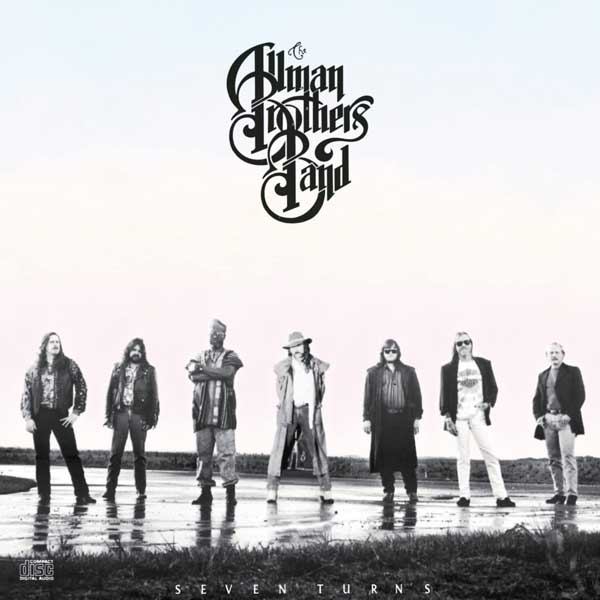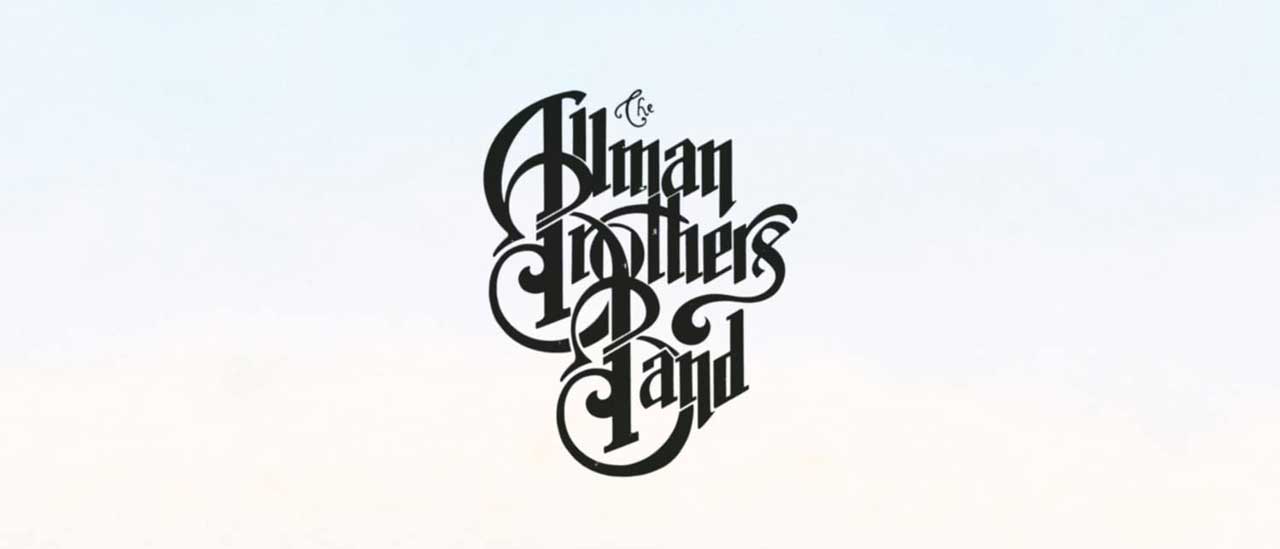
Good Clean Fun
Let Me Ride
Low Down Dirty Mean
Shine It On
Loaded Dice
Seven Turns
Gambler's Roll
True Gravity
It Ain't Over Yet
After going on hiatus in 1981, the Allman Brothers Band were enticed back to the road when the success Dreams, a comprehensive four-CD box set laced with unreleased tracks, prompted lucrative offers from promoters.
Enter Warren Haynes, a country/blues guitarist who’d been playing in Dickey Betts's band. “I’d always been a huge Allman Brothers fan and had met them ten years earlier,” he said. “I was just planning a solo album when I got a call saying: ‘We’re putting The Allman Brothers back together. Would you like to join?’ The positives all outweighed the negatives so I kinda jumped in with both feet.”
Epic were alarmed when the band insisted on touring before recording – they didn’t think the band would survive the tour. But the resulting album, Seven Turns, was better than anyone dared hope; the Allmans were back on form.
Its title refers to a Navajo saying that there are seven times in life when a momentous decision must be made, and a wrong one creates a dead end. After the trials the band had been through, the decision to reunite for the second time turned out to be the right one.
With Tom Dowd producing, Gregg Allman in fine voice and new guitarist Haynes tandem-riffing with Betts, they sound primed for the future. But it wasn't just about reinvention as much as reclaiming past glories, and on the snarling single Good Clean Fun, the countrified Let Me Ride, and the jazzy jam True Gravity they did just that.

Every week, Album of the Week Club listens to and discusses the album in question, votes on how good it is, and publishes our findings, with the aim of giving people reliable reviews and the wider rock community the chance to contribute.

Other albums released in July 1990
- Armchair Theatre - Jeff Lynne
- Smooth Noodle Maps - Devo
- The Hard Way - Steve Earle
- Lights...Camera...Revolution! - Suicidal Tendencies
- Apple - Mother Love Bone
- Spirits Dancing in the Flesh - Santana
- 10 Brick by Brick - Iggy Pop
- Flesh and Blood - Poison
- Naked Thunder - Ian Gillan
- Tales from the Twilight World - Blind Guardian
- Cowboys from Hell - Pantera
- Goodnight L.A. - Magnum
- In the Heart of the Young - Winger
- Un-Led-Ed - Dread Zeppelin
- Bellybutton - Jellyfish

What they said...
"Apart from the rippling opening number, Good Clean Fun, which he co-authored, Gregg Allman's contribution is limited to singing and the organ, but the band seem more confident than ever, ripping through numbers like Low Down Dirty Mean, Shine It On, and Let Me Ride like they were inventing blues-rock here, and the Ornette Coleman-inspired True Gravity is their best instrumental since Jessica. (AllMusic)
"Gone is the walking-death gloss of their two early-Eighties Arista albums; in its place are vivid recreations of past glory. Betts’s latest gonna-ramble travelogue, Let Me Ride, ends with a cascading piano roll direct from Southbound; Low Down Dirty Mean is Pony Boy redux." (Rolling Stone)
"Pretty pathetic, if you ask me: the Allmans had certainly reunited to cash in on their past and nothing else. They do it with enough verve and credibility, but overall, that's not even second-rate. For diehard fans only, and only for diehard fans. This doesn't mean, though, that you can't put it on whenever you're not in the mood for enjoying music for music's sake. In which case, please proceed to your nearest record store and buy every single blues album you can find. I'll bet you anything that none of them are much worse than Seven Turns." (Only Solitaire)

What you said...
T.C. Grantham: I’ve never been big into jam bands like Grateful Dead and the Allman Brothers, but this was good. After their initial disbandment, this album showed it was not the end. There was still life left in the band. The songs are strong and True Gravity showed that their sound could adjust to the times. A solid effort I greatly enjoyed.
Mike Canoe: Another club pick helped immensely by being far removed from the year it was actually released. Definitely not what I was listening to in 1990 and it's hard to imagine that it appealed to anyone under the age of 40 when it came out.
Seven Turns gives me "Road House" vibes, both in terms of a rowdy bar outside the city limits and the 1989 Patrick Swayze film where a night can't go by without someone or something getting smashed.
It's the same lyrical playground of most Southern rock (or hard rock, to be honest): mean dudes and meaner women, but the musicianship is high and I've picked up new things I like with each successive listen.
Greg Schwepe: To say the Allman Brothers were survivors is a bit of an understatement. By the time Seven Turns was released in 1990 they had endured the death of two founding members, countless lineup changes as they tried to find their footing, a changing musical landscape (Brothers of the Road was Arista’s attempt to have them sound like the Doobie Brothers), and the whole process of reforming after a long layoff. So, what do you do after all that? Well, come out guitars blazing with a grittier, rawer sound that really fits the Southern rock mould but offers just enough to keep the fans of the early classic sound interested.
Initially only armed with an Allman Brothers compilation CD, I finally decided to do a deep dive into their catalogue a number of years ago to see what I’d been missing, and boy had I missed a lot of great stuff, from their very first albums, plus the solo work from Dickey Betts and Gregg Allman. And a whole treasure trove of newer stuff they had released too.
As I randomly bought some of the new Allman material, Seven Turns made its way under the microscope for musical dissection. As mentioned already, the material seems to hit a little harder. Not sure whether it was the band saying “we’ll show you we can still rock out” or new recording technology, equipment, amps, etc. just made the sound jump out a little more. Gregg Allman’s bluesy rasp comes into play immediately on Good Clean Fun. And now you have Warren Haynes onboard to duel with Dickey Betts. The guitar vibe will not be lacking on this album.
This sounds to me like an updated “modern” Southern rock album. And I use that term lightly, because even though the Allmans get lumped into that category, their early albums didn’t seem to earn that tag with me. For the blues/rock/hard rock aficionado who maybe didn’t like the early Allmans due to some of the slightly freeform jazzy jam stuff, this is probably for you. And for the longtime devotee who liked the Allmans for that slightly freeform jazzy jam stuff; this is probably not for you.
You do have the Allman Brothers mainstays; the bluesy Hammond organ, acoustic-tinged songs (the title track) and an almost eight-minute instrumental in the form of True Gravity. Reminds me of In Memory of Elizabeth Reed only because it might be in the same key.
If the band was looking to get back in the game with a new album and touring after nine years of inactive status, this was the way to get you in front of your fans again. 8 out of 10 on this one for me.
Gus Schultz: This is my least favourite of the three studio albums of their last reformation. The album came off as a little flat and stale for me at the time perhaps because of Tom Dowd trying to revive their old sound of the seventies or maybe the addition of Haynes and Woody hadn’t found their groove yet. It came out at a time when the music scene was changing with the arrival of the Seattle sound and southern rock fading way back in time.
It is, however, a masterpiece compared to their previous studio release and maybe even a couple of albums before Brothers Of The Road. Not a bad listen, and it is much more enjoyable today than it was upon release. I would suggest a listen to Hittin’ The Note, their last studio album. Although Dickey Betts was gone it is an amazing album with Greg Allman soaring in his vocals and Warren Haynes monster playing it is one of my favourite Allman Brothers Band albums.
Jacob Tannehill: I’m a little younger than the average Allman Brothers fan. So this was my first real exposure to them (outside of the “hits”).
Good Clean Fun came roaring in, just like the old days. Had a groove and swagger.
When Dickey brought Warren Haynes with him, we knew we had something special that hadn’t happened since Eat a Peach and Brothers And Sisters.
Not a bad song in the lot. Dickey's tunes are more poignant now. Especially the title track. We knew there was something special when they came back.
Keith Jenkin: With long-term producer Tom Dowd on duty and the addition of Warren Haynes, this Dickey Betts-steered reunion mostly replicates the sound of classic era Allmans albeit with a slightly updated twist. Gregg's contribution isn't huge - It is his name that is still the main attraction after all and I do think the record is light on the classic guitar improvisations that helped make their early albums so great, something I think the 1991 follow-up Shades Of Two Worlds better embraces. Still, a keeper, and I can't post this without mentioning this lineup's great June 1991 show at London's Hammy Odeon that I was lucky enough to catch. The band were on fire at this time, something the Evening With and Play All Night live albums from this era more than demonstrate.
Wade Babineau: I was already a fan of the Allman Brothers before this album, but still thrilled to see them reunite. Saw them on the tour for this record in Toronto and managed a pass for a meet and greet. Great show and tunes like Good Clean Fun and the title track mixed in with the older material just fine. Certainly a solid output from the group. Only thing on the meet'n'greet was Gregg was not there. However, a Canadian $1 bill signed by Betts, Haynes, Butch and Jaimoe is a treasured item. Haven't listened to this in some time. Thanks for the excuse to give it another spin. Solid 8/10. As many have noted, it's hard to touch those early albums.
John Davidson: Seven Turns is however an album out of time. A solid slice of southern slide guitar blues rock in a year where thrash hadn't yet gone mainstream, when the first whiff of lumberjack shirts started to emerge from under the gloomy rainclouds of Seattle, while we grew increasingly weary of the stale smell of hairspray from further south on the west coast of the USA.
How does Seven Turns measure up to the competition?
Well, with the benefit of hindsight, it fairs pretty well compared to the other albums released that year (though that might say more about 1990 than the Allman Brothers).
Having listened through a couple of times I enjoyed the album as a whole. It’s got that laid-back bluesy feel, but with the exception of the instrumental True Gravity, the chorus of Loaded Dice and the languid guitars of Gambler‘s Roll nothing really lingers in the memory once the album finishes. 6.5/10.
Steve Pereira: The first five albums are the essential Allman Brothers, with personal choice as to which of the last three of those, Fillmore East, Peach, or Brothers And Sisters is most essential (for me it's Brothers And Sisters). The albums after Brothers And Sisters are secondary, with the band spending more time on tour and enjoying themselves rather than on focusing on recording good music. They broke up in 1976, then got back together in 1979 to make a couple of what are widely considered, including by the band themselves, to be dreadful albums, so broke up again in 1982.
On their 20th anniversary, with commercial interest in the band quite strong, Allman, Betts, and Tucks were convinced to reunite with new players in order to tour. They found the band was good enough to record, and Seven Turns was the start of effectively a second career in which they produced some decent enough albums in the manner of a nostalgia band living on past glories. The work is professional, but it's not why the band are known and respected.
It's worth playing the album, and then going back to the classics such as Eat A Peach, Brothers And Sisters and Fillmore East to remind yourself why they are legendary. Sometimes magic inhabits and inspires a band, and that's the case with those early albums. Seven Turns is professional, competent, and worthy; but an album like Brothers And Sisters is fucking awesome. It's understandable that such a magic feeling can't be replicated just like that. Be thankful we have those early albums.
And we also have Duane Allman's work on the Derek & The Dominoes album, especially the slide guitar on Layla. One of those utterly sublime moments in rock history.
Kari Hautakoski: Late career classic.
Philip Qvist: Where do I start with The Allman Brothers Band? Well; I started late with the band, with them only appearing on the fringes of my music radar in the early 80s thanks to two very familiar songs; Ramblin' Man and Jessica. A couple of other songs started to appear on said radar, such as Pegasus and Melissa - but, generally speaking, they weren't a band that I was listening to at the time; even when Seven Turns was released.
That all changed as the 90s were coming to an end, and suddenly I was exploring their first five albums - with At Fillmore East being my pick of those five.
In all honestly, comparing Seven Turns to the likes of Eat A Peach or Brothers And Sisters is a near-impossible task. Those first five albums are the band's standout records - but compared to what they released after that, especially the dreadful late 70s and early 80s, then Seven Turns comes out looking pretty good - and is one of the great comeback albums of the rock era.
I'm not sure how much input Gregg Allman had on the album; singing lead on five tracks, not much playing on his B3 Hammond Organ, and just one co-songwriting credit; although Good Clean Fun is one of the strongest tracks on the record. Guitarists Dickey Betts and Warren Haynes, along with keyboard player Johnny Neel, did most of the heavy lifting, while my favourite other songs were the title track, Gambler's Roll and Let Me Ride.
Any good Allmans' album will have at least one instrumental - and although True Gravity delivers, it is hardly in the same category as In Memory Of Elizabeth Reed.
So how do I rate this album? Well, if their first five are a mixture of 9s and 10s, then Seven Turns will lose marks in comparison. However, it is a very good and enjoyable album in its own right, and still remains one of the strongest albums in the Allmans' catalogue. An 8, possibly 8.5, from me.
Robert Baptista: I enjoyed it then and I enjoyed listening to it yesterday celebrating 4/20

Final score: 8.13 (60 votes cast, total score 488)
Join the Album Of The Week Club on Facebook to join in. The history of rock, one album at a time.

